In selecting the materialities (key issues) of the NH Foods Group, a top-level dialogue was held between outside experts and President and Representative Director Hata. For this discussion, we invited Ms. Mari Yoshitaka for her perspectives on ESG investment, and Mr. Toshio Arima, who has been driving SDGs in Japan for many years and has experience as top management.
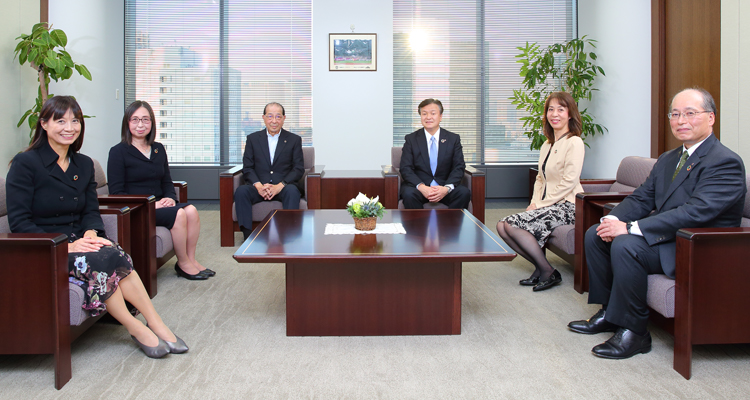
- Date
- November 16, 2020
- Location
- NH Foods Ltd. Tokyo Branch Office
- Participants
-
- Toshio Arima:Chairman of the Board, Global Compact Network Japan
- Mari Yoshitaka:Mitsubishi UFJ Research and Consulting Co., Ltd.
- Yoshihide Hata:President and Representative Director
- Sadanori Miyagai:Director and Managing Executive Officer
- Yasuko Kono:Outside Director
- Facilitator
- Ayako Sonoda:Cre-en Inc
Note: Positions and departments are correct as of the date of the discussion.
Aim behind materialities integrated with management
Sonoda: This is the first materiality review in four years. What is the aim behind this?
Hata: We found that the materialities we decided previously (in 2016) were not as effective as we had hoped. Additionally, social trends such as the SDGs and ESG have changed dramatically over the past three years, so I strongly feel the need to think once more on how the NH Foods Group should respond to societal expectations. We also have established a forum to hear opinions from employees. By simultaneously developing the Vision and the Medium-Term Management Plan, we hope to create materialities that integrate management strategies and sustainability strategies.
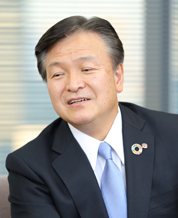
President and Representative Director
Yoshitaka: Since around 2010, after the 2008 financial crisis, investors have been paying attention not only to the financial aspects of companies, but also to non-financial areas such as Environment (E), Society (S) and Governance (G) in order to assess long-term corporate risk and growth potential. It is important to explain how materialities, which incorporate ESG elements, are linked to medium- to long-term business strategies as a corporate growth story.
Sonoda: In the process of determining materialities, discussions are carefully conducted within the company, placing an emphasis on post-formulation effectiveness.
Miyagai: As a forum for discussion, there was the conventional executive-centered Sustainability Committee (chairman: Hata), but a cross-organizational meeting consisting of 13 departments, called the ES Subcommittee, was newly established under the committee. It serves as a forum for departments to share the issues they are facing and the initiatives they are undertaking with other departments. After a total of 20 hours of discussion here, the Board of Directors will give final approval to a proposal.
Arima: It is necessary for managers to have the resolution to create new business models by incorporating new and up-to-date world values. I hope that discussions on materialities will lead to new business areas.
Linking with the raison d’etre of a company, it’s the “Vision”
Sonoda: What are your aims with regard to linking the 2030 “ideal corporate picture” to your business strategy in conjunction with materialities?
Hata: As one milestone toward the realization of the NH Foods Group’s Corporate Philosophy of the joy of eating, we are building a “corporate ideal” for 10 years from now, in 2030. By creating the Vision and linking materialities with business strategies, we aim to enhance both the financial and non-financial values, that is, what the NH Foods Group will provide to the society by 2030.
Yoshitaka: It is great to be able to explain both the traditional forecast and the backcast from 2030 to the world. I would like to see NH Foods continue to demonstrate its strengths.
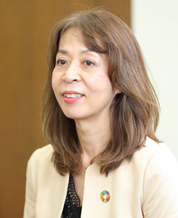
Mitsubishi UFJ Research and Consulting Co., Ltd.
Candidates for materialities
Sonoda: Moving forward, I would like to hear the frank opinions of the experts regarding the individual themes that are candidates for materialities.
・Protein
Yoshitaka: As an investor, I would like it if a company’s name could be concealed and, just looking at materialities, it could be understood where the company stands. Otherwise, investors find it difficult to make comparisons within the industry. I feel that “protein” through food fits the NH Foods Group, and I appreciate that animal welfare and climate change measures are candidates.
Hata: Five million tons of table-meat (chicken, pork, and beef) are distributed in Japan per year, and the NH Foods Group handles 20% to 21% of this amount. Come to think of it, this means that one out of every five occurrences of someone eating table-meat is someone eating one of our products. We will continue to promote this fact.
・Environment
Yoshitaka: Many Japanese companies focus on the discussion of reducing the effect of greenhouse gases, but I would like more specific information. For example, I would like an explanation of where company factories are located, their ability to withstand typhoons or unexpected abnormal weather, and whether logistics are free of issues. Climate change should not be considered separately from disasters and disaster prevention, but should be viewed as a long-term BCP for the entire company. Stories and strategies on risks from the perspective of global damage and resilience from the perspective of how to avoid said risks are necessary.
Hata: I feel we need to commit to investing in and advancing climate change initiatives.
・Employees
Arima: Because there are so many departments in a company, it’s hard to see how a company is doing at the present moment, what the challenges and risks are, and how much care and hard work is being put into those challenges and risks. I would like to see the creation of a place where there is more mutual understanding.
Hata: I want to foster a corporate culture in which employees can act as they see fit, independently and autonomously, regarding the company’s policies. I want to create empathy by matching the company’s vision and direction with the goals of individuals. To that end, I plan “town meetings” in which I can directly communicate with employees at each site.
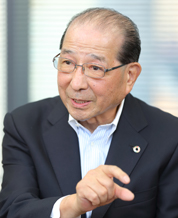
Chairman of the Board, Global Compact Network Japan
・Human rights
Arima: At the Global Compact Network Japan, where I am the Executive Director, companies exchange information and hold workshops through subcommittees. In fact, the human rights subcommittee has the second largest number of participants after the ESG subcommittee. This means that companies are quite interested in human rights.
Hata: Foreign technical intern trainees are also active in the NH Foods Group. We need to create more opportunities so that skills can be further improved within the NH Foods Group. For example, we hope that people from Vietnam will have the opportunity to come to Japan and learn in our company before returning home and taking an active role in our Group’s Vietnamese subsidiary.
・Sports
Arima: It’s great that children and young people grow up supporting the Nippon-Ham Fighters. I can feel the deep-seated popularity of baseball, and I think it is worthwhile to have a ball park, which is the base of baseball.
Yoshitaka: If the new ball park can be used as a platform for various technologies, connecting it to DX by collecting data on consumption trends and preferences, I think it will be appealing to investors as a story. There are examples of technology being used to connect various stadiums around the world.
Using the SDGs as a common language
Sonoda: Regarding the current discussions on materialities, relevance to the SDGs was examined for each theme. Could you tell me more about that?
Hata: Together with the promotion of business, I would like each and every employee of the NH Foods Group to view the SDGs as their own responsibility.
Yoshitaka: The SDGs are a useful common language that can explain how corporate efforts can lead to sustainable goals. Nowadays, the SDGs are included in textbooks for students of all ages, and schools give out homework asking questions such as “What does the work of those close to you have to do with SDGs?” The other day, I was surprised to receive a rather frank question from a student at a SDGs job fair: “What does the company plan to do after 2030?” This is the era of “choosing a company from the perspective of the SDGs”.
Arima: I've heard that at one company, work felt like receiving contract jobs, with the requester simply asking “When can you have this done by?” However, by connecting the content of the work to the SDGs so that they could understand it, they realized that the work they were doing was to solve social issues, and that motivated them.
Hata: We would be happy if we could explain our job in connection with solving social issues and be praised by our family. I would like to use the ideas you have given me to promote internal penetration of SDGs as a common language.
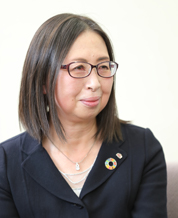
Outside director
Expectations for the future
Sonoda: Finally, could the experts tell me about your expectations and any messages of support you have for NH Foods?
Arima: Thank you very much for taking the initiative in receiving comments from outside the company. Regarding human rights, there are cases where it is easy to explain when a problem arises overseas because there is a human rights policy that can be used as an explanation for NGOs and external stakeholders. I think it would be prudent to ensure you can do the same. (Note: After this dialog, we formulated the Human Rights Policy and published it on our website)
Yoshitaka: Overseas, even short-term investors now talk of climate change. In the future, I hope that as a Japanese company in the food industry, you can convey your value to overseas markets as well. It is a waste to have such fantastic promotional material yet not proactively send it out. I would like the President to continue communicating openly.
Sonoda: Thank you very much. In response to the expectations of the experts, I would like to ask those from NH Foods to say a few words each.
Kono: This time, I thought that we should identify materialities and promote them to society in the form of products, services, and information. Since it is difficult for consumers to recognize invisible values, I would like to make them visible and clearly explain said values to society. On the other hand, when it comes to disseminating a concept such as materialities within the company, I think it is important to break it down and translate it into a more understandable form.
Miyagai: I’ve once again realized the importance of telling stories. I want to do my best so that management can think about the story and share it with both society and employees.
Hata: As I mentioned at the beginning, I would like to enhance the effectiveness and execution of materialities. I once again felt as though I had to pour my soul into it so that each and every employee would see it as their own business. I would like to continue this kind of dialogue with people outside the company, so we look forward to working with you in the future. Thank you very much for today.
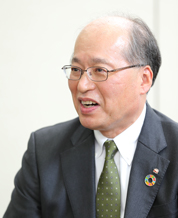
Director and Managing Executive Officer
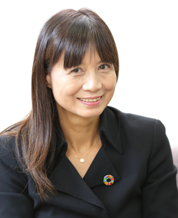
Cre-en Inc
